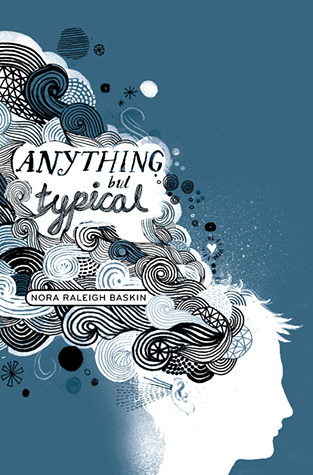Jason has autism. The world tends to overstimulate him and sometimes he can't control his movements. He doesn't say much, and that only seems to cause drama in a world that is constantly searching for a response. But that doesn't mean there's nothing in his head: Jason writes stories quite often, and he posts them to a website called Storyboard, where he meets a member named PhoenixBird. He thinks she might actually be his girlfriend... but in a world where even his mother struggles to understand him, how can he expect PhoenixBird to accept who he truly is?
Anything But Typical is the second book I've read from someone on the autism spectrum's point of view (the first being Marcelo in the Real World by Francisco X. Stork, one of my favorite books of all time). Seeing the world through someone with this condition's perspective is of course intriguing and insightful, but simply as someone who enjoys writing and connecting with others through the Internet, I was immediately interested in this novel's premise. The idea itself is golden (as is this cover).
The execution? Not as much.
Don't get me wrong, Anything But Typical did not outright falter. I think Baskin did a pretty good job of showing readers what was going on in Jason's head as he interacts with the world and struggles to be the socially-superior person everyone wants him to be. I could feel his hopelessness and I often felt angry at how some of the adults around him would react - fictional adults who represent what happens all too often in real life. The teachers are not trained as well as they should be to work with him, his mother struggles to understand how her son can possibly feel anything when he is not very expressive, and his grandmother... Well, his grandmother doesn't understand much of anthing. I also thought it was good to see how Jason's stories reflect his views of himself in relation to the world around him, even if it does get borderline corny at some points.
However, the last quarter of the book just felt clunky, which is odd because I would have expected that issue to arise when Jason is flashing back to past times as the present story continues. But that element was done well enough. There is so much build up to the climax, but once we get there, it's a bit underwhelming and doesn't have a very good flow to it. Keep in mind I totally understand the need to have a 'realistic' ending that is not totally happy or totally miserable - I like that aspect of the book. (And really, that's what's accomplished in the book I mentioned earlier, Marcelo in the Real World.) But the pace was weird and one of the moments where he was daydreaming wasn't written in the clearest way.
Since I was so excited to read this book based on the premise, I have to say I'm a bit disappointed in how this one turned out. Genius idea, rocky execution.

